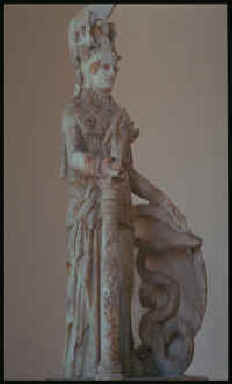GREEK HISTORY AND PHILOSOPHY:
ORIGINS OF WESTERN CULTURE

Blocks 3-4, 2002
Professor Dobson, Armstrong 131, x 6442
Professor Riker, Armstrong 135, x 6566
TEXTS
Harrison, Themis (to be distributed)
Homer, Iliad
Wheelwright, Presocratics
Herodotus, Histories
Aeschylus, Oresteia
Sophocles, Antigone, Oedipus Rex, Oedipus at Colonus
Euripides, Orestes and Other Plays ("Orestes," "Iphigeneia at Aulis")
Plato, The Last Days of Socrates; The Symposium and The Phaedrus: The Erotic Dialogues of Plato
Aristotle, Philosophy of Aristotle
The HarperCollins Study Bible
Steiner, Rudolf, Christianity and the Occult Mysteries of Antiquity
Pomerory, Ancient Greece
|
ASSIGNMENTS
BLOCK I
Week 1
1. Introductions. History of the Minoan-Mycenean Period (Pomeroy 1-40). Greek
Dancing (Syrtaki)
2. Themis, pp. 1-49
3. Themis, pp. 51-94, 119-151;
4. Themis, pp. 385-415; 444-479
5. Themis, pp. 480-535
SUNDAY, 7:15--FILM: ZORBA THE GREEK (142 min.)—Max Kade Theater, AH 300
|

Minoan Snake Goddess
|
|
Week 2
1.Iliad,Bks.1-7
2. Iliad, Bks. 8-14
3. Iliad, Bks 15-21
4. Iliad, Bks. 22-24; History Lecture on Archaic Greece (Pomeroy, 41-129)
5. Presocratics: sections on Thales, Anaximander, Heraclitus;
|

Rampin' Horseman
Archaic
|
| Week 3
1. Presocratics: sections on Parmenides, Empedocles, Pythagoras
(Pomeroy, 131-200)
2. Herodotus, Histories, Bk. 1
3. Herodotus, Histories, Bks. 6-9 (selections to be announced)
Film: IPHIGENIA AT AULIS—Max Kade Theater, AH 300 - 1-4 PM
4 Aeschylus, Oresteia (Agamemnon );
( Pomeroy, 201-244)
5. Aeschylus Oresteia (Libation Bearers & Eumenides)
|

Athena in the Parthenon (5th Century, Roman Copy)
|
|
Week 4
1. Sophocles, Antigone; History Lecture
( Pomeroy, 246-328)
2. Sophocles, Oedipus The King, Oedipus at Colonus
Film: GOSPEL AT COLONUS, 3:30 PM (83 min.)—Max Kade Theatre
3. Euripides, Iphigeneia at Aulis (Please review film), Orestes
BLOCK BREAK
BLOCK II
Week 1
1. MID-TERM EXAM DUE
2. Day off
3. Day off
THANKSGIVING BREAK
|

Cnidian Aphrodite (4th Century)
|
|
|
|
Week 2
1. Plato, Euthyphro, Apology (Come Prepared!)
2. Plato, Phaedo
3. Plato, Symposium
4. Plato, Phaedrus
5. Aristotle, Ethics, Bks. I, chs. 1-4, 7, 13; II, 1-7 III, chs. 1-5.
Week 3
1. Aristotle, Politics, Selection; Physics, Bk. II: 1-8
2. Aristotle, Ethics, X, 5-9; Metaphysics, XII, 1-7, 9
3. HarperCollins Study
Bible(TBA)
4. Bible (TBA)
5. Bible (TBA)
Week 4
1. Steiner (TBA)
2. Steiner (TBA)
3. FINAL EXAM ( Group Orals)
|

The Death of Socrates
 The Last Supper The Last Supper
|
GENERAL INFORMATION
This is a two-block course, and therefore you must complete both blocks to receive credit. You will receive one grade for the entire course. We expect to see improvement in your
thought and writing over the two blocks. We will evaluate written assignments for quality of writing and thinking. Correct grammar and spelling are a
sine qua non. We also require that your writing be "non-sexist."
It is also your responsibility to understand and follow the Honor Code. Ask questions if you are uncertain in any way about this requirement.
We expect intelligent and involved reading, writing, and an active listening
and speaking presence in class. No single disaster will cause you to do poorly in the course.
We want you to study together and talk about class readings outside of class. Thinking together in and out of class will help your learning. We will be planning small group
presentations on some of the reading, and may ask you to lead off some classes with questions, to see how well you've prepared.
Do not expect all the material assigned to be covered in class. What is not covered, we assume you will read, discuss and think about carefully at home. You will be responsible for it on the examinations.
The history readings from Pomeroy are meant to help you to get background
on
the original source material. We will be lecturing on this material in class,
and we expect you to know what we lecture on. If you should miss a history
lecture, you will be responsible for writing a paper on the same period,
of approximately five pages.
We expect you to attend class, unless you have a bona fide reason for absence. Unexcused absences will result in a significant lowering of your discussion grade.
Please notify either Professor Dobson or Riker if you must miss a class,
before you miss it!
Class Schedule:
We will meet from 9:30 AM until 12:00 PM every day except Thursday, when we
will meet at 9:45 AM and finish at 12:15 PM
Please note that the three days in between Block Break and Thanksgiving there
will be no class. HOWEVER, your midterm is due on Monday of Block II, and you
must complete the assignment thoroughly for the second Monday of Block 2 (after
Thanksgiving). Please plan to return on Sunday so that no one will miss
class on Monday. (*These days have been garnered from usual days off during the
Blocks)
Writing:
Block I: One short (1-2 pages) paper on Themis; one paper (2-3 pages) on the Iliad, one paper (2-3 pages) on Herodotus or Aeschylus; mid-term exam.
Block II: one 2-3 page paper on Plato, one 2-3 page paper on Aristotle’s Metaphysics, and one
longer paper connecting Steiner's ideas with earlier authors. Final: Oral
Examination (in small groups).
Policy on Late Papers: We expect papers to be handed in the day
of class. If you have not finished your paper, please come to class
anyway. Late papers will be marked more severely and we will expect
them to be more complex and longer than those handed in on time, because you
will have more time to work on them.
Grading: Class participation 20%; papers 50%; mid-term and final 30%.
Promptness is appreciated and rewarded






 The Last Supper
The Last Supper